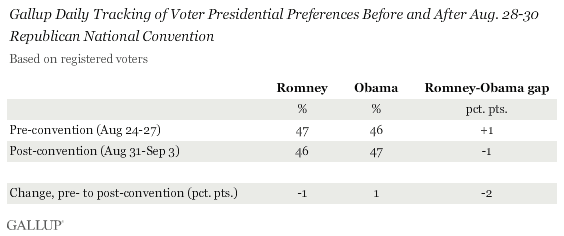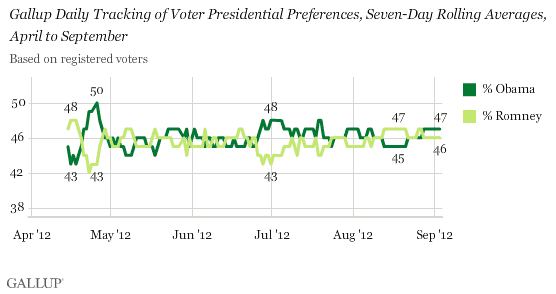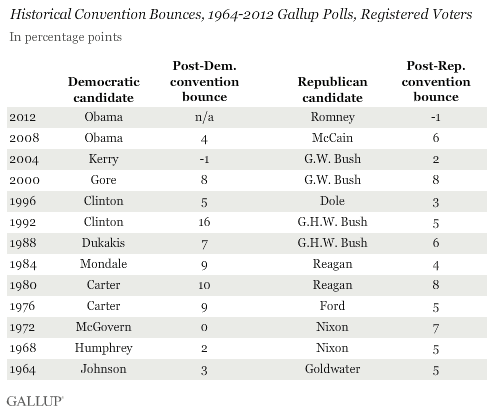PRINCETON, NJ -- Mitt Romney received no bounce from last week's Republican National Convention, as the 46% of registered voters who supported him in Aug. 31-Sept. 3 Daily tracking is essentially the same as the 47% who preferred him in Aug. 24-27 tracking, the four days preceding the convention.

The lack of a bounce is consistent with Gallup's immediate post-GOP convention reaction poll, showing Americans giving Romney's acceptance speech, and the convention more generally, rather muted ratings.
Gallup's standard seven-day rolling average of voter presidential preferences has shown Obama at 47% and Romney at 46% each day since Aug. 29. That is a slight shift in Obama's favor, as Romney held a consistent two-percentage-point advantage for nine days in mid-August, shortly after announcing Paul Ryan as his vice presidential running mate. That was the longest period in Gallup Daily tracking showing Romney with any kind of edge. The candidates have been closely matched since Gallup began Daily tracking in April, apart from a few brief periods showing a Romney advantage (mid-April and mid-August) or an Obama advantage (late April and late June/early July).

Romney Third Recent Nominee Not to Get Convention Bounce
Past presidential nominees have seen their support among registered voters increase five points on average after their party's nominating convention, according to Gallup's review of the history of convention bounces going back to 1964.
Romney becomes one of three recent nominees -- and the first Republican -- who did not receive a convention bounce, joining George McGovern in 1972 and John Kerry in 2004. Both McGovern and Kerry, like Romney, challenged incumbent presidents, with McGovern suffering a landslide defeat to Richard Nixon and Kerry losing a close election to George W. Bush.

The 2004 and 2012 campaigns have been similar in that they involved an incumbent president with middling approval ratings seeking re-election in a year in which voters were paying a high level of attention to the election well before the conventions took place. Thus, with voters already highly involved in the election and likely to have a well-formed opinion of whether the president deserves a second term, the potential of the conventions to change their vote preferences is more limited.
It would not be out of the question, then, for Obama to receive little boost from his party's convention taking place this week, as was also the case in 2004 for Bush, whose support increased just two points after the Republican National Convention in New York City.
Implications
The Republican National Convention this year failed to generate a lot of excitement among voters nationwide. It is not clear if that is a reflection of the Republicans' presentation, their nominee himself, or the fact that it came just before the Labor Day holiday. In any case, the net result is that Romney is no better positioned in the 2012 election after the convention than he was before it.
Convention bounces are an expected part of each presidential campaign, so the fact that Romney did not receive one is surely a disappointment for his campaign and his supporters. However, with Americans' engagement in elections much higher earlier on in the 2004, 2008, and 2012 elections than in prior election years, conventions may no longer serve to introduce the nominees to Americans. Rather, Americans probably already have a good sense of who the nominees are and what they would do if elected president. Because of that, the conventions may not produce the changes in voter preferences they did in the past. This could particularly be true in years in which incumbents are running for re-election, and voters' choices may boil down to whether they want to re-elect the president as opposed to choosing which of two candidates they would prefer to be president.
Survey Methods
Results are based on telephone interviews conducted as part of Gallup Daily tracking Aug. 24-27 and Aug. 31-Sept. 3, 2012, with random samples of 1,816 and 1,827 registered voters, aged 18 and older, living in all 50 U.S. states and the District of Columbia.
For results based on the total sample of registered voters, one can say with 95% confidence that the maximum margin of sampling error is ±3 percentage points.
Interviews are conducted with respondents on landline telephones and cellular phones, with interviews conducted in Spanish for respondents who are primarily Spanish-speaking. Each sample includes a minimum quota of 400 cell phone respondents and 600 landline respondents per 1,000 national adults, with additional minimum quotas among landline respondents by region. Landline telephone numbers are chosen at random among listed telephone numbers. Cell phone numbers are selected using random-digit-dial methods. Landline respondents are chosen at random within each household on the basis of which member had the most recent birthday.
Samples are weighted by gender, age, race, Hispanic ethnicity, education, region, adults in the household, and phone status (cell phone only/landline only/both, cell phone mostly, and having an unlisted landline number). Demographic weighting targets are based on the March 2011 Current Population Survey figures for the aged 18 and older non-institutionalized population living in U.S. telephone households. All reported margins of sampling error include the computed design effects for weighting and sample design.
The questions reported here were asked of a random half-sample of respondents each night on the Gallup Daily tracking survey.
In addition to sampling error, question wording and practical difficulties in conducting surveys can introduce error or bias into the findings of public opinion polls.
For more details on Gallup's polling methodology, visit www.gallup.com.
